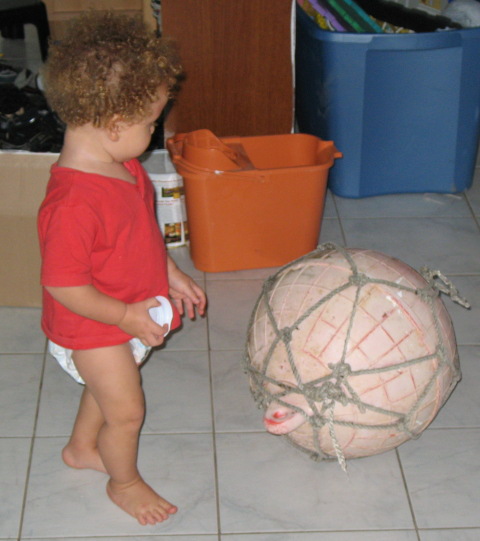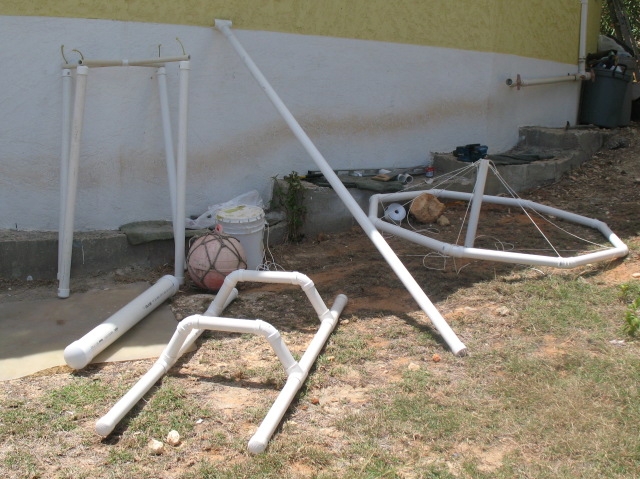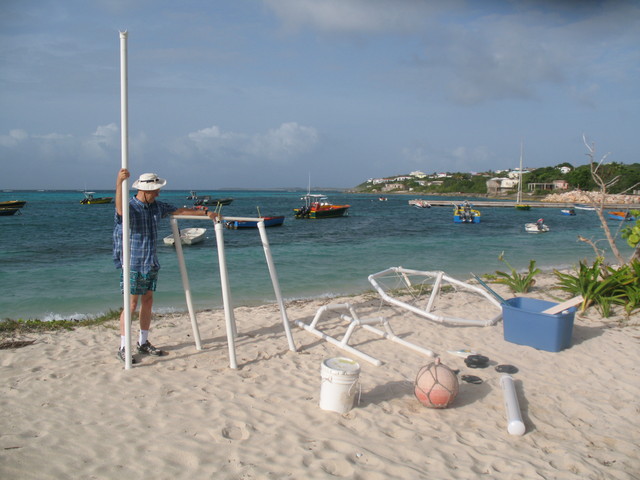User:Vincecate/Models
The plan is to use similar amounts of plastic in 7 different models that are each 1/25th scale and compare them in similar wave conditions in Island Harbor, Anguilla.
I am going to assume migration makes 25 foot waves the largest we have to deal with because with a 1:25 scale model that makes for a nice round number, a 1 foot wave.
With a 25 foot maximum wave measured trough to crest, we sort of only need 12.5 feet above average water level. But with rogue waves and safety margins, lets design for 25 feet above average water level. Seems like a spar with 25 feet above water could have a total length of 250 feet. Scaled down for 1:25 model we could use 10 feet of PVC pipe. If I use 2 inch diameter pipe in the models that is like 50 inches diameter in the full scale version.
Cost estimation sort of indicates that the same weight steel ships are about the same cost. So if PVC in the models is replaced by steel in the full scale versions, equal weights will be roughly equal costs. However, the ratio of model thickness to prototype thickness is not going to be the same for all the different models. Also, these models are not all the same weight. So I don't claim that these models are really a fair comparison but close enough that we may learn something.
Contents
Models in testing
- Tension Circle House - 8 sides of 2-foot each
- multi-spar model (funded by Joep)
- Pipe Spar - 10 feet of 2 inch pipe (7.5 lbs) Put a T on top and cut it in half so have a flat thing I can put a test platform on with rubber bands.
- Short-Fat Pipe Spar - 3.5 feet of 4 inch pipe - 10 lbs total
- catamaran - 14 feet of 2 inch pipe cut and with fittings to make catamaran - 14.5 lbs total weight
- 14 inch buoy/ball with hanging ballast - so modeling about a 30 foot ball - This is User:Vincecate/BallHouse but also kind of the givens life raft design and a lot like the User:Vincecate/GeodesicVessel approach. Model weight not counting ballast 7.5 lbs
- short cylinder - using a 5 gallon paint bucket for model - 4 lbs
- hanging ballast - use for BallHouse and Short Cylinder - 4 strings to single ballast in middle
Models not yet planned
- semisubmersible - can have square or triangle of pipes underwater and legs sticking up or frame on top legs down
- raft made by lashing pipes together - 5 pieces with 2 cross pieces underwater (120-(2*12)/5= ~19 inches for 5 pieces
Video
At the start of the video there will be a full glass of water on the model. During the video the motion and splashing of water, as well as how much is left at the end of the video, will give help give some idea of how stable it would feel to someone standing on the structure.
I will also have a washer on a string that can swing back and forth. The maximum height of swing will also be a measure of stability.
Will have pipe that is tied to weight on the bottom so it does not move up and down in the background for comparison and measuring wave heights (will have marks on it).
The camera will be oriented so that the big waves are coming from one side, so water in glass motion is more visible. Might use colored water.
I will shoot video from the side with a horizon/beach/island in the background for a stable reference point.
I will also shoot video with the camera mounted on the structure. Slowed down the view of the glass of water, waves, and horizon should be interesting.
Made a poor mans steady-cam from pvc pipe to help stabilize the camera.
Still shots
Will take still shots of each model out of the water, in the water, and view from under water.
Force for Scale model speed testing
The force on a scale model should scale with the mass, which is with the cube of the scaling factor. So for a 1/25th scale model, the force should be 1/15625. So we have:
8 ton kite --> 1 lb 16 ton kite --> 2 lbs 32 ton kite --> 4 lbs
With a known weight being pulled down by gravity you can provide the same force to the model by connecting a rope between the model and the weight over a pulley. Just have to keep pulling the pulley forward at the right speed so that the weight stays between the pulley and the ground or water. With my Hobie pedal powered kayak I think this will be easy enough.
However, a similar weight and pulley walking alongside a pool is probably easier. So I may just do that. But the deepest pool I have access to is just over 6 feet deep.
With speed results from this we can see how fast such a kite could pull a full sized seastead. This will tell us if the migration idea is plausible.
Ballast weights
For the weight on our force meter I could use a water jug where I can adjust the amount of water to see what works.
For ballast
- weights from weight set
- sand in plastic bags or jugs
- washers, cement, lead
Problems
- normal sched-40 fittings are heavy (elbows, Ts, etc) - try to find lighter ones
- some have ballast, some have strings, some have platforms
- joints and bending in models are not modeling full scale materials or design
- catamaran really needs stronger pipe than other designs - others could be thinner pipe
Previous models
Modeling in general
Sponsors
My two summer students and I will build, test, and document the results for a number of these models. If you would like to support this effort we are accepting sponsorships at $100 for each model. You can just put your name here and after we are done you can pay via paypal. Thanks.
- multi-spar - Joep (already paid)


